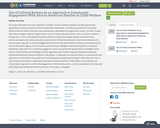
This empirically based curriculum addresses a number of issues related to disparity and disproportionality experienced by African American families involved with child welfare. It is well documented that for decades African American children have been overrepresented in child welfare throughout this country. Yet little is known about what strategies might be implemented in order to reverse this phenomenon. This curriculum is based on findings from a Community-Based Participatory Research Project that brought together African American community leaders and university faculty to examine both the historical evolution and prominent features of a cultural broker approach to promote engagement and partnership with the African American community and the county child welfare agency. This curriculum provides research highlights, historical perspectives, conceptual frameworks, approaches for community engagement, tools and experiential opportunities to strengthen social worker understanding, and knowledge and skills regarding issues related to disproportionality and disparity experienced by African American families in child welfare. It addresses five areas: the history of cultural racism and oppression in child welfare, the prevalence of racial disparities and disproportionality in child welfare, the role of community partnership and collaboration with African American families in child welfare service delivery, the cultural broker approach to community engagement in child welfare practice, and key considerations for improved child welfare partnerships with African American communities. (108 pages) Siegel, D., Jackson, M., Montana, S., & Rondero Hernandez, V. (2011).
- Subject:
- Social Work
- Material Type:
- Module
- Author:
- CalSWEC
- Date Added:
- 02/26/2018